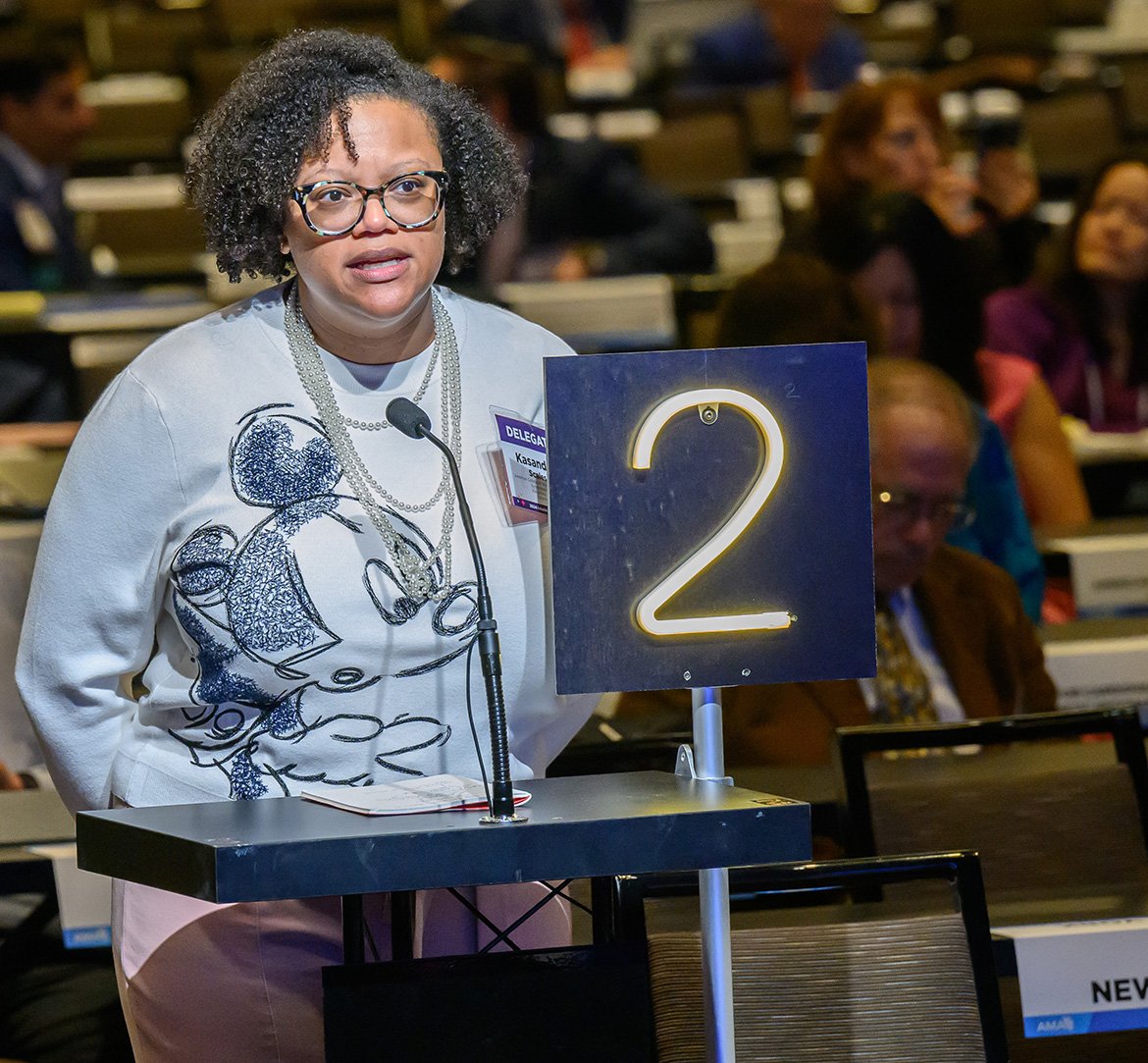Lake Buena Vista, Fla.—About 700 physicians gathered over the last week for the 2024 AMA Interim Meeting here, a stone’s throw from Walt Disney World, which is promoted as “the most magical place on Earth.” But physicians will need more than pixie dust to make their dreams of protecting seniors’ access to care come true.
They need support in Congress to back big changes to a broken system that is in line to cut the payments that support doctors’ practices by 2.8% Jan. 1, further endangering access to high-quality physician care. That is why fixing Medicare is the AMA’s top advocacy priority, with leaders reporting significant progress in that effort. Already, a bipartisan majority of 233 members of the House of Representatives has written to leadership demanding inclusion of a positive 2025 payment update for physicians in the year-end omnibus.
And just a week prior to the Interim Meeting’s opening—following AMA advocacy in leading the charge to reform the Medicare payment system—a bipartisan group of House members introduced H.R. 10073, the Medicare Patient Access and Practice Stabilization Act of 2024. That measure would raise physician payment rates by one-half of the Medicare Economic Index by applying a 12-month payment update of 4.7%.
“Congress must prioritize passing this legislation during the lame-duck session,” AMA President Bruce A. Scott, MD, said at the meeting’s opening session. “Make no mistake, this is going to be an uphill battle. But I believe that with the unified voice of physicians from across the country—from every state and specialty—together, we can fix it. We can fix Medicare now.”
So far this year, the AMA’s Fix Medicare Now campaign has generated over 60 million paid impressions, nearly 700,000 engagements, and almost 507,000 messages to Congress. Visit the website now to tell your representative to cosponsor the bill.
And regardless of what happens during the lame-duck session, the AMA is strongly encouraging physicians from around the country to come out in force for the AMA National Advocacy Conference in Washington, D.C., in February. The goal is to show Congress the real-life impact of the broken Medicare payment system on patients and on physician practices and the communities across America that doctors serve. Learn more and register now.
Long-term fixes detailed
To fix the problems with the nation’s largest single health care payer over the longer term, the AMA supports the bipartisan Strengthening Medicare for Patients Providers Act. That measure would give physicians with an annual Medicare payment update tied to the Medicare Economic Index.
The AMA also supports the bipartisan Provider Reimbursement Stability Act, which would reform the Medicare payment schedule budget-neutrality policies by, among other things, requiring the Centers for Medicare & Medicaid Services (CMS) to reconcile inaccurate utilization projections based on actual claims and prospectively revise the conversion factor accordingly.
And, in addition, with substantial input from national medical specialty societies and physicians across the country, the AMA has developed a statutory proposal to replace the Medicare Incentive-based Payment System’s (MIPS) tournament model of payment adjustments with a more sustainable approach tied to annual payment updates. The MIPS replacement, called the “Data-Driven Performance Payment System,” also would give CMS incentives to share data with physicians and improve the measures.
Such changes are needed to protect patients’ access to care in the U.S. health system already facing widespread doctor shortages.
Medicare’s ripple effect
In his opening address, Dr. Scott highlighted the heartbreaking story of an ob-gyn forced to close their practice after nearly three decades because it was no longer financially sustainable. The AMA’s research shows that physician Medicare pay, when adjusted for inflation, has dropped by 29% since 2001 (PDF). In its final rule for 2025, the Centers for Medicare & Medicaid Services projects another 3.5% rise in the Medicare Economic Index, which measures the cost of running a medical practice.
But the physician losses continue to mount, as Dr. Scott noted, “magnified in rural areas where patients today face a shortage of 20,000 primary care physicians, where 80% of counties lack specialty care, and where 1,100 counties are without a single obstetrician.”
At an Interim Meeting open forum on Medicare payment reform, ob-gyn Kasandra Scales, MD, of Alexandria, Virginia, spoke about how Medicare’s lack of an annual inflation update affects patients beyond the older adults that Medicare is designed to serve.
“A lot of times people associate Medicare with older populations,” Dr. Scales, a delegate for the American College of Obstetricians and Gynecologists, said in an interview. She noted that Medicaid is often indexed at a fraction of the Medicare rate, but added that “the complexity of care does not go down just because there is less payment for it.”
“And what we've been seeing,” she added, “is that a lot of places are actually ... going from an ob-gyn practice to just a gyn-only practice, exacerbating care deserts. And what that does is it creates a really, really reduced area of access for patients to find obstetrical services that would provide them with the prenatal care they need, including timely diagnosis of any type of anomalies. And this, ultimately, not only jeopardizes care during the antepartum and postpartum period, but access to continuity of care over the lifespan as well.”
Problem for all specialties, settings
It seems that no matter the physician specialty, doctors are speaking with one voice on the critical importance of fixing Medicare.
The AMA’s president-elect, Bobby Mukkamala, MD, is an otolaryngologist in Flint, Michigan, which has been deeply affected by economic adversity. Medicare physician payment cuts contribute to a situation in which he is left “trying to serve my community ... with half the number of otolaryngologists that were there than when I started,” he said at the Medicare pay open forum. It is in underserved areas such as Flint, Michigan, and also in many rural areas, “that are the hardest hit by the lack of action” from Congress.
AMA Board of Trustees Chair Michael Suk, MD, JD, MPH, MBA, an orthopaedic surgeon, also said at the open forum that his feeling—having traveled and heard from doctors across all of America—is that “for the first time in history, all doctors are unified around a single message. There’s no infighting. There’s no commentary. We all agree that Medicare needs to be fixed, and in particular we agree that the adjustments to the inflationary index are critical.”
The broken Medicare physician payment system is not just affecting physicians from all specialties and the patients they care for. It also is taking a toll on physicians in different practice settings, with seemingly no one being immune.
Dr. Suk, an employed physician, noted that he often gets questions from doctors in employed settings about why the issue should matter to them.
“You know when it hit home? It hit home last year when we took a cut and they got the increased compensation-production requirement from their system,” Dr. Suk said. “They said, ‘In order for us to compensate you the same, because revenue is down, we need you to do more.’
In Dr. Suk’s health system, that amounted to surgeons having to take on 40 more cases a year with no additional compensation.
Need to keep pushing
After four years of Medicare payment cuts and a fifth scheduled for 2025 unless Congress acts, there has been a major shift in how Capitol Hill sees the issue and its impact, said Todd Askew, the AMA’s senior vice president of advocacy.
“As these cuts began to intensify, really, the problem that was already existing, our initial forays were to talk to folks from Capitol Hill a couple of years ago, and there was very little interest,” Askew said at the Medicare open forum. The consistent message from lawmakers and their staffers was: “Access is fine. All doctors take Medicare patients. We're not hearing anything about this problem except from you, so I don't think there's enough momentum to do anything about it."
But Congress, as evidenced by majority support for a positive payment update for 2025, is starting to see the reality of the situation.
“Clearly, we're at a breaking point,” Askew said. “The implementation of those cuts is going to be what sends a lot of physician practices off the edge.”
Yet even the move to stabilize physician payment for 2025—a relatively light lift in comparison with the major reforms that are needed, and that the AMA has outlined—will “take a continued, sustained, grassroots push,” Askew said. “We need to all be talking to our members of Congress. Our medical associations need to be flying folks in. They need to be catching them at home when they're home on the weekends. Every way we can continue to talk to members of Congress to make sure they understand the magnitude of this problem, the impact it's going to have on your ability to care for patients who are on Medicare.”
Explore further with the AMA’s Medicare Basics series, which provides an in-depth look at important aspects of the Medicare physician payment system. With these six straightforward explainers on budget-neutrality rules, MIPS, the Medicare Economic Index and more, policymakers and physician advocates can learn about key elements of the payment system and why they are in need of reform.
Read about the other highlights from the 2024 AMA Interim Meeting.





